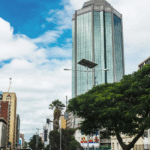There is no room for racism in Africa. Any attempt to divide people along racial lines must be challenged outright. Holding public office does not erase a history of hate speech or racist behaviour. This principle is once again under scrutiny in South Africa. Sport, arts and culture minister Gayton McKenzie faces a Human Rights Commission investigation over historic posts on social media that contained one of the country’s most offensive racial slurs.
The South African Human Rights Commission (SAHRC) gave McKenzie until Wednesday evening to apologise, undergo sensitivity training, donate to an agreed charity, and delete the posts. At the time of publication, the posts were still online.
The issue flared after podcast hosts on Open Chats claimed Coloured people committed incest and were “crazy”. The episode was later deleted, but McKenzie’s Patriotic Alliance (PA) party, which secured 2% of the national vote in 2024, largely supported by Coloured communities, filed complaints with the police and the SAHRC. McKenzie told the national broadcaster: “There should be no place to hide for racists.”
Soon after, social media users uncovered his own posts on X, dating from 2011 to 2017, in which he used the word “kaffir”, an unutterable slur for Black people. Though the posts did not target individuals, they reignited fierce debate about racism, identity and the unfinished legacy of apartheid.
McKenzie responded on X on 11 August. He wrote: “I did tweet some insensitive, stupid and hurtful things a decade or two ago, I was a troll & stupid. I cringe when seeing them, and I am truly sorry for that. I shall subject myself to the investigation.” He also insisted that he was Black himself.
Tshepo Madlingozi, the SAHRC’s anti-racism commissioner, stressed the seriousness of the case in an interview with Newzroom Afrika on 17 August. “The use of the K-word has been declared unlawful … it is one of the most offensive slurs that one can use. The harm is ongoing, the harm continues, and the alleged offences are still there.”
South Africa’s racial tensions cannot be separated from its history. In 1948, the apartheid regime divided citizens into four categories: Native, Coloured, Indian and White. People of mixed heritage, descendants of enslaved south-east Asians, Indigenous Khoisan, Black Africans and Europeans, were placed in the Coloured category. The system gave them marginally better privileges than Black Africans, but still excluded them from full rights.
More than three decades after apartheid ended, the framework lingers. The state still collects data using the same four racial categories: Black African, Coloured, Indian/Asian and White. In the 2022 census, Coloured people made up 8.2% of the population. Many remain in the segregated areas forced on them by apartheid, and divisions continue to run deep.
McKenzie continues to deny that he ever directed the K-word at anyone. On 10 August, during a Facebook Live broadcast, he said: “In my entire life, I have never called anybody the K-word, never. We are the victims. This is a political campaign.” His spokesperson did not respond to requests for comment.
For analysts, his remarks highlight the sensitivities of identity and racism in South Africa. Tessa Dooms, co-author of Coloured, explained: “Even if what he had to say was not meant to be derogatory, in a context where Coloured communities have been accused of anti-blackness, the use of that word by a very prominent Coloured figure in society would always be read in the context of presumed anti-blackness.”
She added that while racism does exist among some Coloured people, “anti-blackness was cultivated as part of the apartheid project.”
Jamil Khan, who researches Coloured identities at the Johannesburg Institute for Advanced Study, said the episode shows how apartheid’s legacy still shapes social relations: “What this shows us, really, is that South Africans don’t really know each other.”










